|
KEEP THIS NEWSLETTER ALIVE! FATHERS DAY IS JUNE 17th! Shop Online at https://www.irishnation.com |
|

Marvellous Gifts! Family Crest Shields |

Display your Heritage: Family Crest Flags |

=============
IN THIS ISSUE
=============
=== News Snaps from Ireland
=== New Free Resources at the Site
=== Ancient Ireland #3: The Firbolg
=== Voyage of Dreams by Kath Fearing
=== Bloomsday - A Poem by Darien Brooks
=== YouTube Videos of Irish Interest
=== Gaelic Phrases of the Month
=== Monthly Free Competition Result
Popular Articles from recent Newsletters:
Ancient Ireland #2: The Tuatha de Danann
Reading the Irish Landscape
Ancient Ireland #1: The Milesians
35 Things You Never Knew About Dublin
The 1916 Easter Rising
The Flight of the Earls
A Trio of Famous Irish Painters
==========
FOREWORD
==========
Ireland has been basking in actual Summer sunshine for
the last week and although the mood in the economy is
certainly downbeat the brightness and warmth outdoors
are a great relief.
The main event in the country at the moment is a
Referendum which could have long-term implications
for the country. The government parties are looking
for a 'Yes' vote and although the opinion polls are
in their favour victory is by no means a certainty.
Enjoy your FREE Ireland Newsletter!
Michael
P.S. Please DO FORWARD this Newsletter to a
friend or relative. If you have a website or Facebook
page or Blog (or whatever!) then you can help
us out by putting a link on it to our website:
www.ireland-information.com
Do tell your friends about us as this helps
to keep this newsletter free!
WE NEED YOUR HELP - CONTRIBUTE!
Got something to say? Don't keep it to yourself!
Why don't you submit an article for inclusion
in the next edition? Go here for more information:
https://www.ireland-information.com/newsletter.htm
Do you have access to a website? You can help to
keep this newsletter alive by adding a link to
any of our websites below:
https://www.irishnation.com
http://www.irishsurnames.com
https://www.ireland-information.com
http://www.allfamilycrests.com
http://www.irishpenpals.com
If you have an AOL or HOTMAIL account then you
may get better results by viewing this
newsletter online here:
https://www.ireland-information.com/may12.htm
The only way that you could have been
subscribed to this newsletter is by filling
out a subscription form at the site whereupon
a confirmation notice would have been issued.
If you wish to unsubscribe then go here:
https://www.ireland-information.com/newsletter.htm
========================
NEWS SNAPS FROM IRELAND
========================
|
IRELAND IS 15TH HAPPIEST COUNTRY The recent 'Better Life Index' compiled by the OECD has revealed that Ireland is ranked 15th in terms of happiness based on a wide number of metrics including access to healthcare, housing, crime statistics and income. The full list reveals that the Danes are the happiest people in the 34-country study followed by Norway, Switzerland, Netherlands, Austria, Israel, Finland, Australia, Canada and Sweden. Bottom of the list were Hungary, Portugal and Russia with the USA at 12th and the UK at 14th. The Irish earn over US$24,000 annually, better than the OECD average of just over US$22,000. The Irish education system is in line with the OECD average in terms of reading, literacy, maths and science skills. The troubles in the Irish economy are reflected in the fact that 60% of 15 to 64 year-olds are employed, below the OECD average of 66%. The life expectancy of 81 years is 1 year above the OECD average. In terms of a daily positive experience of life the Irish rate at 77%, higher than the OECD average of 72%. 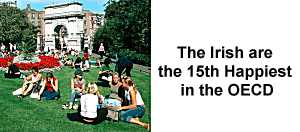
UNEMPLOYMENT RATE HAS STABILIZED Despite some recent high-profile announcements of job gains in the technology and pharmaceutical sector the unemployment rate in Ireland has remained stubbornly high at 14.3%, down by 1.8% over the previous year. Further job losses are expected in the banking sector with Permanent TSB, Ulster Bank and Bank of Ireland all set to lay off large numbers of staff. Emigration has historically acted as an escape option for young people in particular and that trend has certainly been repeated during this current downturn. By comparison, unemployment in Spain is 24%, Greece is 21%, Germany is 5.6%, the UK is 8.2%, France is 10% with the Eurozone average being 10.9%. The USA and Australia have unemployment rates of 8.1 and 5.2% respectively. 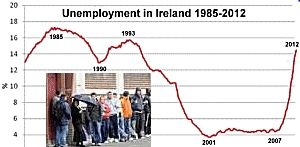
IRISH PROPERTY MARKET REMAINS IN THE DOLDRUMS The Irish property market has been decimated since 2008. Over the last year property experts and commentators have attempted to call the 'bottom of the market' only to see further declines make a mockery of their opinions. New statistics however, may make such a prediction more plausible with the announcement that house prices in Dublin actually increased by 0.5% in April, although nationally prices continued to fall, this time by 1.1%. The data from the Central Statistics Office showed that prices have fallen by 16% in the last year, compared with 12% the previous year. House prices in Dublin are now 55% below the 2007 level. 
Despite reports from real estate agents that there are some sales of houses being completed it is patently clear that the lack of access to funding (ie bank mortgages) is severely depressing the Irish property market. Until either the Irish banks start lending again (this currently seems a remote prospect) or until a foreign bank arrives and starts sweeping up new customers who desperately want to buy (a more likely scenario) then this crucial economic market will remain depressed. IRELAND TO VOTE ON EU TREATY Ireland is about to vote on an EU Treaty that could have far-reaching and long terms effects for the country. Fine Gael, Labour and Fianna Fail have all campaigned for a 'Yes' vote while Sinn Fein , The Socialist Party and many of the independent T.D.'s (members of the Irish parliament) have campaigned against it. 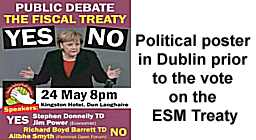
The 'Yes' campaign contend that this Treaty is necessary for Ireland to ensure that the country has access to any future funding should the need arise. Commentators have pointed out that it is unclear that Ireland would be excluded from a 'second bail-out' should the need arise if the 'No' campaign prevailed. The advocates of a 'No' vote have continued to try to link the Treaty to the devastating austerity measures that they see as being imposed on the country by Germany and France in particular. Recent opinion polls have suggested that the 'Yes' side will prevail and that the Treaty will be passed. Stranger things have happened though and if there is a poor electoral turn-out then it is likely the 'No' side will benefit. RETAIL SECTOR HAS BEEN DEVASTATED IN IRELAND Over 400 convenience stores (small grocery shops) have been closed in Ireland over the last two years, the Convenience Stores and Newsagents Association (CSNA) has claimed. Trade is down by 15% with a further 4,200 businesses that are still in operation struggling to cope with high rents and government taxes. The increase in VAT (sales tax) from 21% to 23% has been cited as an example of a counter-productive tax. More tax revenue may have been reaped by the government, it has been speculated, had the rate of VAT actually been reduced rather than increased. 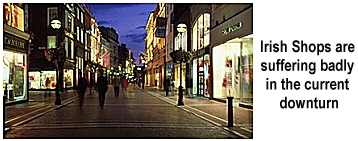
Larger retail outlets seem to be faring better though than those represented by the CSNA. A survey has found that 43% of retailers have recorded an actual increase in sales volume over the last year, with 23% reporting a fall. It is likely the reduction in the rates of staff pay has meant that certain sectors of the economy are starting to become competitive again. An improvement in the value of the US dollar relative to the Euro (on the back of severe turmoil in the eurozone) has also helped those business that export to the US and Canada. ROMANTIC PAINTING IS IRELAND'S FAVOURITE 'Hellelil and Hildebrand - the Meeting on the Turret Stairs' by Frederic William Burton has been voted Ireland's favourite painting. Of ten shortlisted works of art the public were invited to vote and selected the County Clare painters romantic watercolour as their favourite. Runner-up was Caravaggio's 'The Taking of Christ', followed by William Leech's 'A Convent Garden' and Harry Clarke's 'The Eve of St Agnes'. 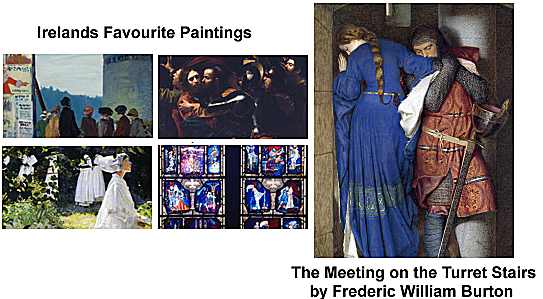 Frederic William Burton was born in County Clare in the west of Ireland in 1816. He was an immensely talented man with a wide-ranging reputation as a miniaturist, portrait painter and as a water-colourist. He was later appointed director of the National Gallery in London by Prime Minister William Gladstone. He died in 1900.
Frederic William Burton was born in County Clare in the west of Ireland in 1816. He was an immensely talented man with a wide-ranging reputation as a miniaturist, portrait painter and as a water-colourist. He was later appointed director of the National Gallery in London by Prime Minister William Gladstone. He died in 1900.The competition has been criticized by the narrow range of paintings that were offered but the effect of the competition has certainly been felt in galleries throughout the country, with attendance increasing on foot of the competition and publicity surrounding the treasures that are freely available to view. MINI-HEATWAVE CAPTURED BY AMAZING PHOTO The University of Dundee has released a photo that is something of a rarity - Ireland without rainclouds! The country has been basking in 25 degree Celsius temperatures during the last week of May with 5-mile tailbacks to popular seaside resorts reported. 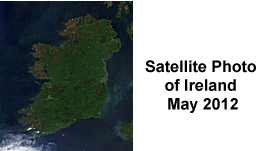
In Ireland any kind of weather is possible but with the default setting being 'rainy' it is no surprise that there has been a rush to the beach! |
===============================
NEW FREE RESOURCES AT THE SITE
===============================
IRISH HOLIDAY AND TOURIST FORUM
Post your question about holidaying in Ireland and
we guarantee an answer will be posted on the board:
https://www.ireland-information.com/irishholidays-irishtourist/irishtouristboard.html

NEW COATS OF ARMS ADDED TO THE GALLERY
The following 5 coats of arms images and family
history details have been added to the Gallery:
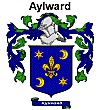
A: Aylward
L: Lanigan, Lavin
T: Toohey, Toland
View the Gallery here:
http://www.irishsurnames.com/coatsofarms/gm.htm
THE PERFECT WEDDING, ANNIVERSARY OR BIRTHDAY GIFT!
We now have over 100,000 worldwide names available.
Get the Coat of Arms Print, Claddagh Ring,
Screensaver, Watch, T-Shirt Transfer or Clock for
your name at:
https://www.irishnation.com/familycrestgifts.htm
=============================
ANCIENT IRELAND #3: THE FIRBOLG
==============================
|
The Firbolg were an ancient race of people that ruled Ireland before the Tuatha de Danaan and the Melesians. The origin of the name of these peoples is still subject to conjecture with 'men of spear', 'men of the bag' and 'men of boats' being suggested translations. Legend has it that the Firbolg were enslaved by the Greeks. For three centuries their persecution continued before they eventually stole some Greek ships and set sail for Ireland. The leaders of the escape were five brothers, Slainge, Rudraige, Genann, Gann, and Sengann. The 5000-strong tribe headed to the west coast of Ireland but were soon scattered by the rough seas and had to land at different bays. They reformed at the Hill of Tara where the country was divided into 5 Provinces. These boundaries substantially survived into modern times and became four Provinces, with two of the original five being merged. 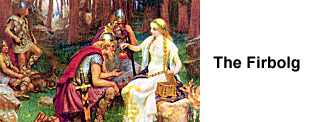
Ireland prospered under the Firbolg. They had a political structure, administration and a kingdom. They brought bronze-age technology to Ireland. They fought off persistent raids by the Fomorians, who they united with on several occasions to ward off would-be invaders. For 37 years there were 7 successive Firbolg kings who ruled over a thriving land. A new wave of invaders were on the way however, the Tuatha de Danaan. Despite negotiations and time-stalling tactics by the Firbolg, defeat to the technically superior Tuatha de Danaan was inevitable. Despite staring defeat in the face the Firbolg petitioned the Tuatha de Danaan for once last chance of victory: a battle between equal forces. Bravery was not enough though. The Firbolg were finally defeated at the Battle of Moytura but not before they impressed the new rulers of Ireland with their fierce courage and honour. The country was divided again with the western part of the country, Connaught Province, being assigned to the Firbolg. From this time on the power of the Firbolg waned. They continued to live in the West of Ireland and, together with he Tuatha de Danaan and the Milesians, are regarded as one of the great Celtic tribes of Ireland. |
KEEP THIS NEWSLETTER ALIVE!
Solve your gift problem at: https://www.irishnation.com

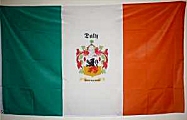
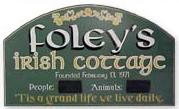
=================================
VOYAGE OF DREAMS, AN IRISH MEMORY
by Kath Fearing
=================================
It is 1903 Ireland. Sixteen-year-old Tess has a dream. Music fills her boundless spirit, and she longs to fill her life with it. But the harsh realities of farm life and taking care of her younger siblings makes the dream unlikely.
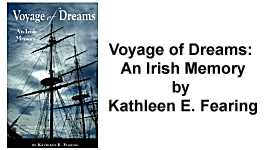 In the chapter below Tess and her cousin Bree are returning home from a dance at the local church. Tess has just learned that Bree plans to go to America and finds it difficult to talk about. ----------------------- Chapter VII Winter had made the road hard and unforgiving. Stubbles of brown grass and stubborn, hearty wild flowers broke through the middle where no one walked or no wagon wheel touched. To one side along the way was a cottage, long abandoned by a friend of their grandfather's who had gone to America with his parents when the Great Potato Famine was at its worst. The family was never heard from again. Their deserted, decaying cottage was overgrown now with vines that reached up from the surrounding fields. Where once a fine thatched roof had provided stout protection from the rain, grass and wild flowers sprouted. Bree and Tess's sturdy shoes scuffed aside pebbles as the walked slowly past the old cottage down the dirt road toward home. Tess broke the thoughtful silence. 'Bree, what do you think of Brian?' 'What do you mean, what do I think? He's a nice boy, one of the best around here, decent and a hard worker.' 'I mean...for a husband. What kind of a husband do you think he would make?' 'Oh, well, now you're getting into foreign territory as far as I'm concerned.' 'Why do you say that? I was just wondering what you thought.' 'Because, love, I don't think I'll ever be married.' 'Ah, Bree, you just wait. The right boy will come along, and, zing, your heart will sing like a canary.' A brief hint of a smile stole across Bree's face. They came to her house and stopped. 'Well, this I know for sure,' she said. 'Brian Delaney has set his heart on you. The question is, where have you set yours?' Bree looked beyond the small, dimly lit cottages --- grayish-white smoke from the warm peat fire curling up from their chimneys --- and gazed out at the rolling sea. Sprays of salty foam exploded off the tops of the waves as they hit the rocky beach. 'There's a big, exciting world out there, Tess. I can feel it. I can almost taste it.' She looked into her cousin's eyes. 'Just be careful before you go giving your heart away, and there being so much life ahead of you.' She breathed in a lungful of salt air and let it out one grain at a time. 'Well it was fun, wasn't it? A real rousing time. You certainly enjoyed yourself, little Tess, singing us all a song and dancing 'til I thought your feet would be set afire.' 'I love the dancing, Bree, I do. The music flows through me like a storm rushes over the hills until I can't possibly stand still. And singing to me is the same as breathing.' Tess stopped to listen to the waves pounding along with her heart as she broached the subject she had been avoiding. 'Please come and talk to me tomorrow, after you're done pulling the lovely cow's teats, that is. I want you to tell me all about how you're planning to leave us.' Bree held onto her cousin's shoulders with her broad strong hands. 'I might go far and away, Tess, but I'll never leave you. That I promise.' 'Come tomorrow, then. I'll be waiting.' Tess waved goodbye as she backed away down the path toward home. 'I will,' Bree said, and watched her cousin disappear into darkness. Then, looking hard at her own front door,she pushed the latch and went inside. ----------------------- 'Voyage of Dreams, An Irish Memory', for ages 12 and up by Kath Fearing Order your copy from Here |
KEEP THIS NEWSLETTER ALIVE! Visit https://www.irishnation.com
|
============= Bloomsday - A Poem by Darien Brooks ============= Bloomsday is an annual celebration of the life of the famous Irish author James Joyce held in Dublin every June 16th. 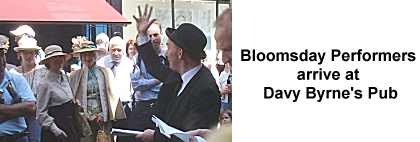
Sit beside me, Irish friend, among patrons at Davy Byrne's we'll eat gorgonzola cheese sandwiches drink glasses of burgundy wine, read selected passages of Ulysses, pay attention to Joyce's words sit beside me, Irish friend, let's talk of James Joyce why he wrote of Dublin from Trieste, Zurich and Paris, Joyce wrote in stream of consciousness, words dictated in dreams Leopold Bloom and Stephen Daedalus, they walked all around Dublin, all morning, all of evening, the sixteenth of June, 1904 people talking, talking all day drinking Guinness, praying to God, Sandycove to Eccles Street, Molly Bloom in bed dreaming. Sit beside me, Irish friend, among patrons at Davy Byrne's we'll eat gorgonzola cheese sandwiches, drink glasses of burgundy wine if we know Leopold Bloom shared his adventures with us, he'll pay for our lunch, walk us on O'Connell Street, introduce us to Stephen Daedalus, why James Joyce is important in Irish and world literature, he'll explain this to us. Why Ulysses is his masterpiece, Bloom will give his reasons, including why, how June 16 is named in his honor. Sit beside me, Irish friend, among patrons at Davy Byrne's let us toast James Joyce and Leopold Bloom's namesake day. Darien Brooks, Wilmington, NC USA |
==============================
YOUTUBE VIDEOS OF IRISH INTEREST
==============================
You can view our archive of Videos of Irish interest here:
https://www.ireland-information.com/irishvideos.htm
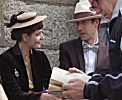
Bloomsday in Dublin
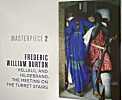
Ireland's Favourite Painting
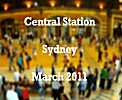
Flashmob Irish Dancing in Sydney, Australia
===========================
GAELIC PHRASES OF THE MONTH
===========================
PHRASE: Ticead amhain go dti an Gaillaimh, le do thoil
PRONOUNCED: tick-aid ah-wann guh dee on gall-yibh leh duh hull
MEANING: One ticket to Galway please
PHRASE: Baile Atha Cliath/an Corcaigh/an Port Lairge/Ciarrai
PRONOUNCED: ball-yeh aq-hah klee-ah/on core-kig/on port lor-ih-geh/keer-ee
MEANING: Dublin/Cork/Galway/Kerry
PHRASE: Cathain a bhainfidh an traenach/bus amach i Cill Airne
PRONOUNCED: kohh-inn a bwin-igg on tray-nock/bus ah-mock i kil arney
MEANING: When does this train/bus arrive in Killarney?
View the archive of phrases here:
https://www.ireland-information.com/irishphrases.htm
==================
COMPETITION RESULT
==================
The winner was: alan_mcguinness@worksafe.vic.gov.au
who will receive the following:
A Single Family Crest Print (decorative)
(US$19.99 value)

Send us an email to claim your print, and well done!
Remember that all subscribers to this
newsletter are automatically entered into the
competition every time.
I hope that you have enjoyed this issue.
Until next month,

Michael Green,
Editor,
The Information about Ireland Site.
https://www.ireland-information.com
Click here to contact us
KEEP THIS NEWSLETTER ALIVE! Visit https://www.irishnation.com